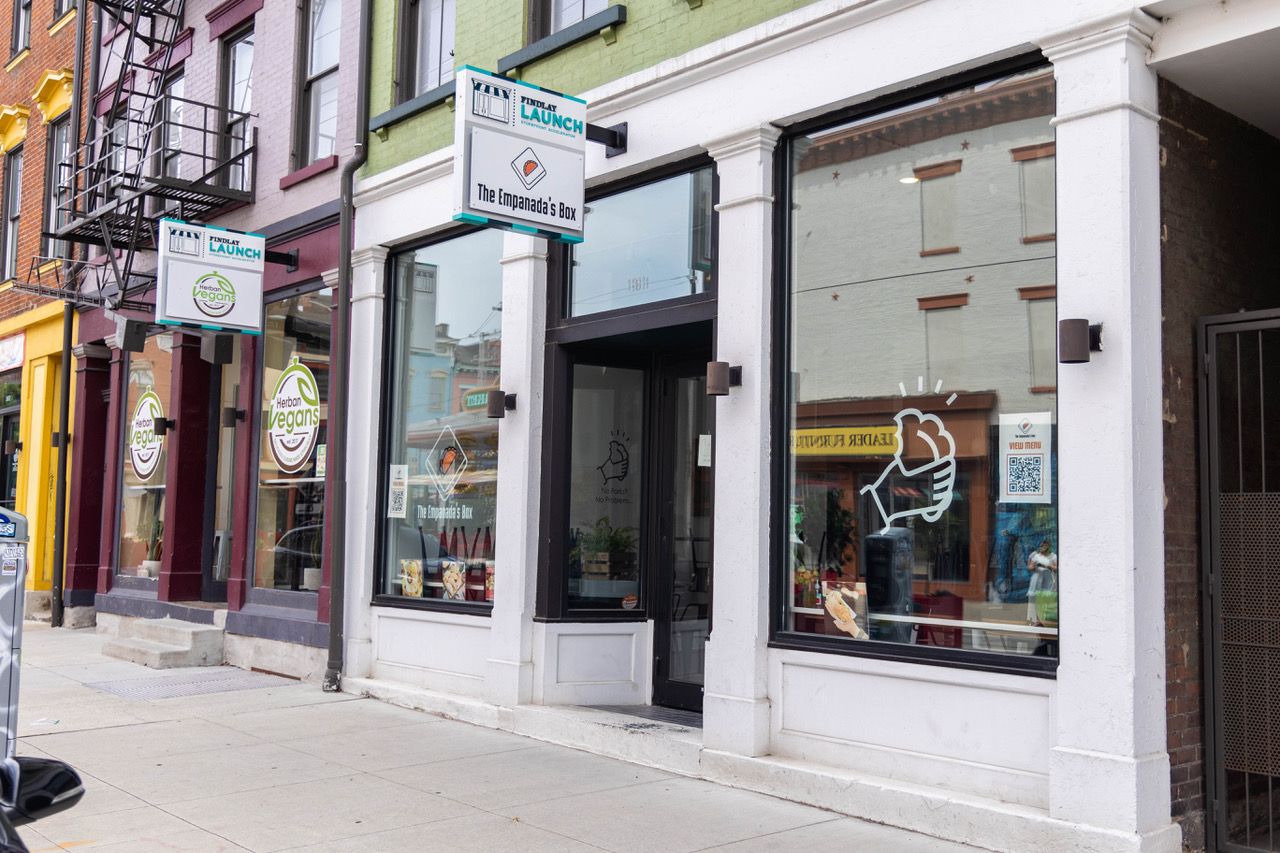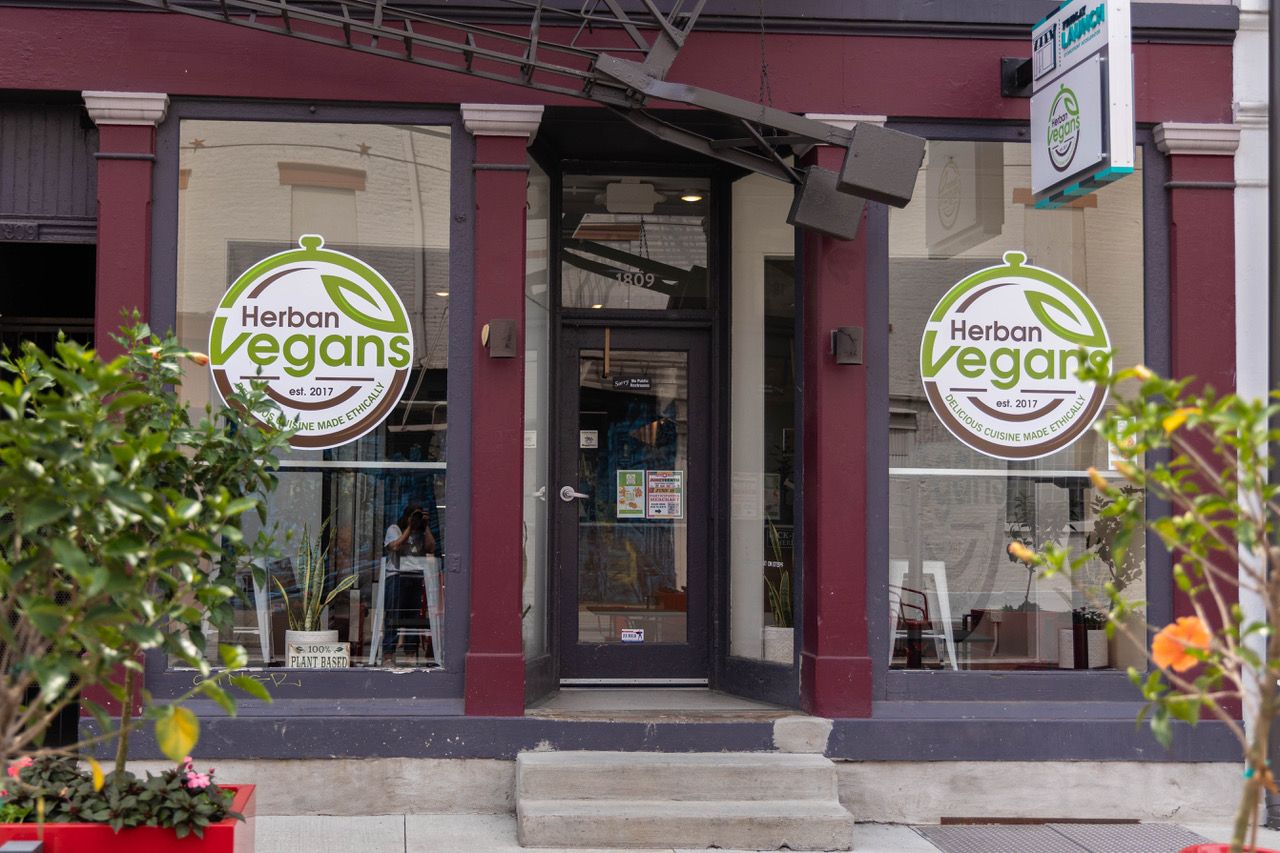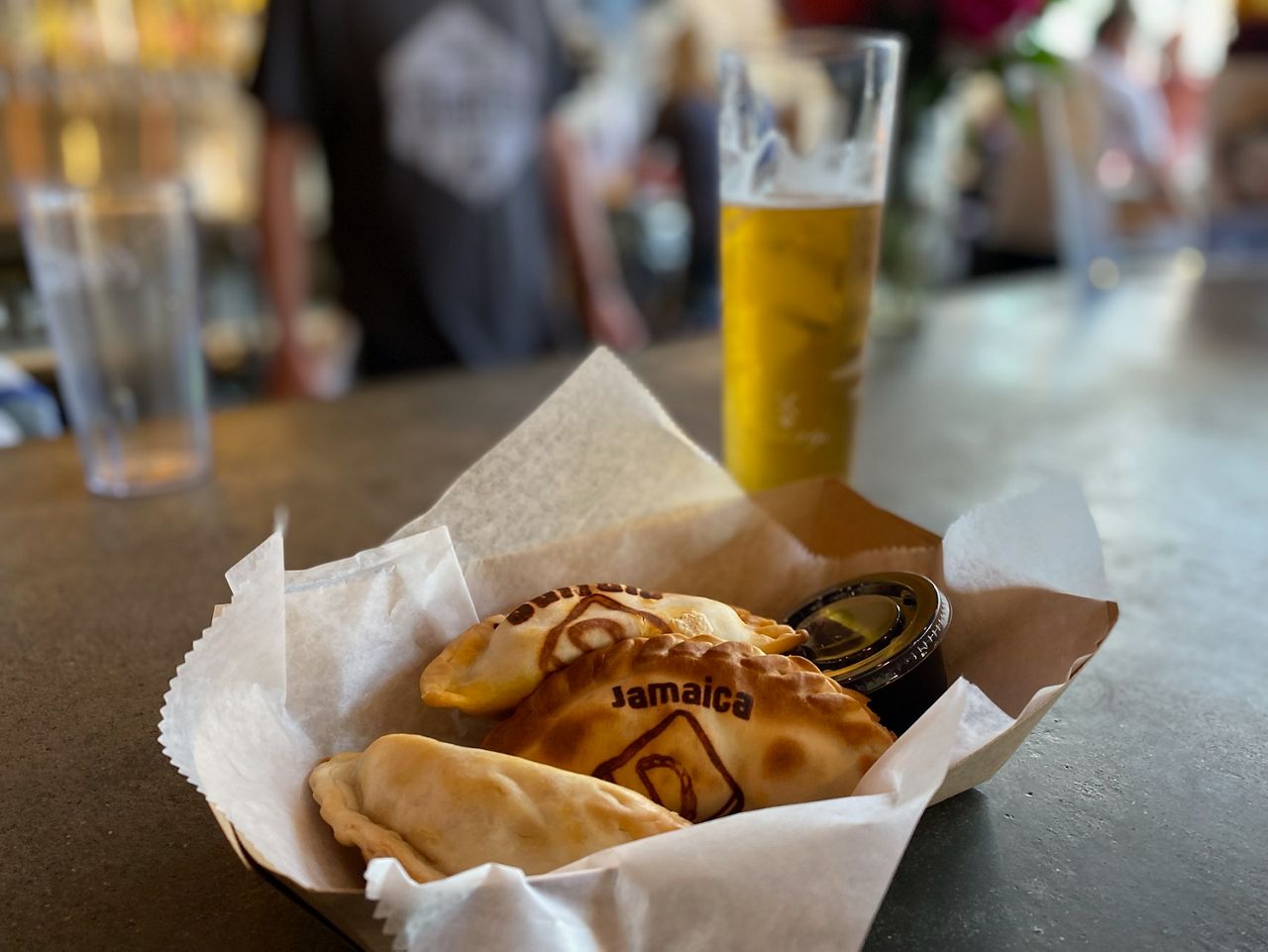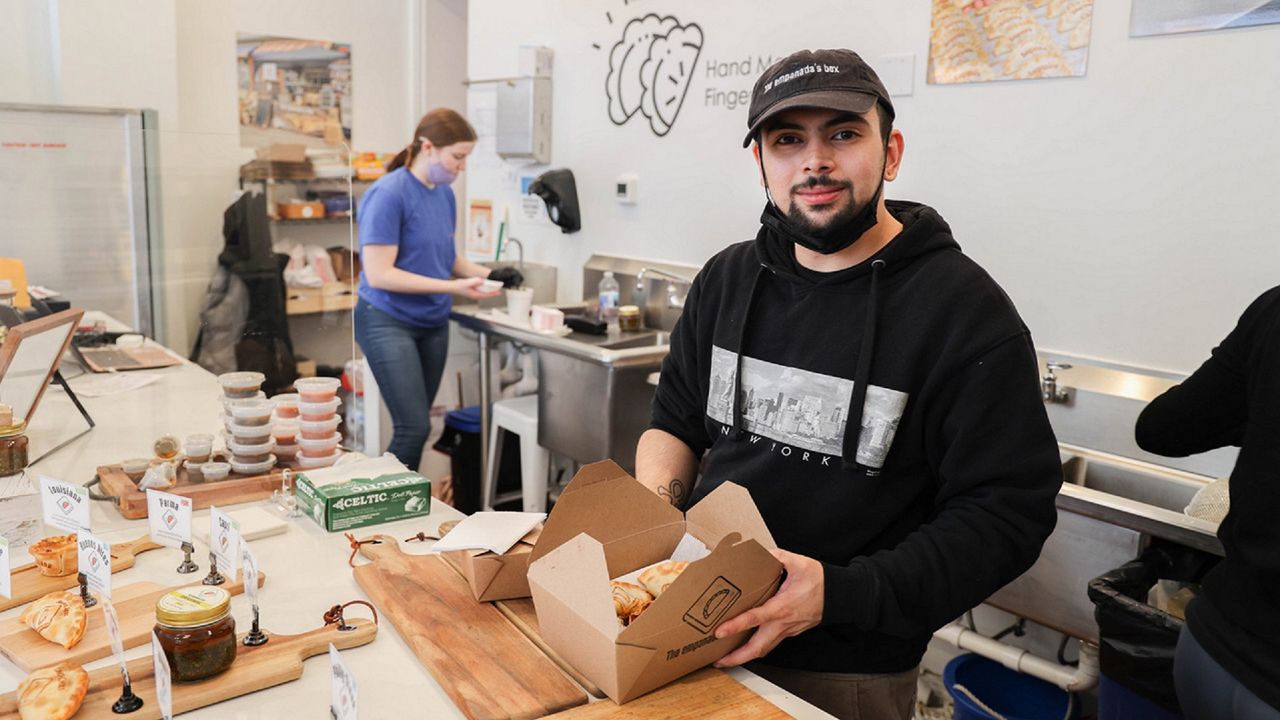CINCINNATI — Lucas Nunez knew he and his family would someday own a food business of their own, but a program through Findlay Market helped make that dream a reality years sooner than he feels they would have otherwise.
What You Need To Know
- The Findlay Launch program provides business classes and a storefront space to budding food entrepreneurs
- The Empanada’s Box was the first participant to graduate from the program
- A goal of the program is to provide opportunities to people who've been historically shut out of
- Findlay Market offers other food business training opportunities through its Findlay Learn program
Nunez, his Aunt Fabiana and Uncle Diego took their The Empanada’s Box concept through the Findlay Launch program. It’s an education and business incubator program geared toward emerging food businesses.
After two months of classes and business training, the Nunez family received a fully built-out storefront space near the market last September to sell their empanadas, popular street food in their native Argentina.
The Empanada’s Box was part of the first cohort to graduate from the program this summer. The Nunezes opened their first brick-and-mortar spot of their own in Covington, Ky., in June.
Applications for this cohort are open until Aug. 31. There are two spots available — one for a takeout or small dine-in restaurant, and the other for more of a food retail shop.
“It was an incredible opportunity,” said Nunez, 24, who’s worked in kitchens and around food since moving to Cincinnati four years ago.
“Through their support and help, we’ve been able to create a business from the ground up in just two years, which is pretty hard to do when you really are starting from scratch,” he said.
Cooking up the next generation of food entrepreneurs
First debuting in 2020, Findlay Launch provides entrepreneurs the space and support to get to their needed proof of concept to grow and expand, or sometimes fail fast so they can go back to the drawing board without having invested too much time and money.
The market outfits the spaces in Over-the-Rhine with fully stocked kitchens and equipment. Speciality tools and decorations are the responsibility of the business operator.
Program participants sign a nine- to 15-month lease. They pay market rate for the space.
“We’re building out a program to serve food entrepreneurs at all different stages, both within the Findlay Market family and throughout the region,” said Teri Heist, the market’s food innovation program manager. She’s been in the role for a little over a year.

Her job is to work with food business entrepreneurs, whether they’re through the accelerator, a vendor at the market or operate out of Findlay Kitchen, a commercial-scale kitchen that allows food businesses to rent space.
The Nunezes had previously rented space at Findlay Kitchen and had a pop-up booth to sell their meat pies at the market on weekends.
“We really try our best to support them, whether it’s helping them find opportunities for success or making connections, because the food business is pretty tough out there,” Heist said.
Making food is in Nunez’s blood. His father, Gustavo, owned a pizzeria in Argentina about 35 years ago called San Diego Pizzeria, named in honor of his kid brother, Diego.
“My uncle saw my dad in the restaurant business as a very young kid. And my dad basically taught them all the basics of making pizza bread and empanadas,” Nunez said.
When the family migrated to the United States in 1999, his father found another job, Nunez said, but his uncle never stopped working in the restaurant.
“Diego never stopped dreaming,” he said. “None of us have.”
Nunez knew the food would be “incredible. His uncle, the “mastermind” as Nunez called him, makes 21 different varieties of empanada with flavors from across the globe, including vegan options.
While the food was delicious, Nunez said, none of them had much business experience. He took on a lot of the sales and business responsibilities, but he doesn’t have any formal business or sales training.

“In the beginning, you’re so focused on making delicious food that you’re not necessarily thinking about the other parts of the business,” he said.
Prior to moving into the storefront, participants take part in a nine-week “Growing into a Storefront” course that teaches the budding entrepreneurs everything from marketing to operations to bookkeeping. It’s not a formal part of Findlay Launch, but it’s required of all participants. The market is recruiting for about a dozen spots in that program as well.
Findlay Market recruits a team of experts — ranging from successful restaurateurs to financial planners — to mentor the students.
In class, the group conducts exercises based on real-world situations, such as building a cost-effective sourcing strategy, efficient kitchen operations, and team management. They also discuss the importance of branding and developing a mission statement that’s reflected in every aspect of their business.
Mentors also provide feedback on their business model while providing critical connections to Cincinnati’s food industry.
Instructors include Frannie Kroner, chef and CEO of Sleepy Bee; her colleague at Sleepy Bee, Emma Cotter; Matt Cuff of Just Q’in and Candice Haynes McInnes, who works in finance.
The course is part of the Findlay Learn education program hosted by the Corporation for Findlay Market, the private nonprofit that manages the market.
“Most people don’t go to culinary school to learn how to run a business. You’re there to cook,” said Kroner. “I thankfully had some incredible teachers along the way, but most people don’t pick up the operations side of things until they’re forced to work in it and figure it out. Emma and I take a lot of pride in being able to share our experiences.”
Breaking down barriers in the kitchen
The Findlay Market team focuses its work on women, BIPOC and immigrant businesses who have faced a range of barriers with starting their business, such as getting a loan. Their goal is to create greater equity in a food business.
As a white woman, Kroner said she feels she’s experienced some “privileges” that benefited her during career. She mentioned access to resources and even networking, and she wants to help provide greater access.
“There’s clearly an access gap in our communities,” she said. “Emma and I both feel like acknowledging that and trying to share our resources and share our knowledge as best we can to help dismantle some of those issues around access and equity.”

Networking is a key part of the program, Heist said. She noted the location on Elm Street creates “natural foot traffic,” especially during events at Findlay Market or on weekends. The connection to the market and the presence on the market’s app, social media pages and website also creates good word of mouth, she said.
That’s vital, Nunez said, whether it’s having someone invite you to cater an event or notify you of an upcoming festival or food show.
“It just kind of opens other doors and opportunities,” he added.
Once inside the storefront, the Findlay Market team assisted his family with “pretty much everything at first,” Nunez said. That includes everything from helping to fill out necessary permits and licenses to promoting their booth on social media.
Nunez credits Findlay Market with helping to organize themselves in a way that set them up for success and ensuring everything “runs smooth” so they could continue to focus on creating the best possible product.
“We got a chance to see what worked, what didn’t work and make changes before really venturing out on our own,” he said.
The Findlay Market works with teams in the cohort and the other training programs to develop “exit plans,” basically next steps for their food business career. They work with developers and neighborhoods across greater Cincinnati to find a good fit for the business.
For the Nunezes, that spot is 212 W. Pike St. in nearby Covington, Ky. It’s next to Braxton Brewing Co., which sells The Empanada’s Box food in its taproom.
“They were so ready for it,” Heist said. “They hit the ground running. They moved in a bit before they actually even graduated from the program.
For a time, The Empanada’s Box operated both their OTR and Covington locations. Ultimately, the Nunezes decided focusing on their space in Northern Kentucky alone made the most business sense right now.
“Findlay Market has definitely been a big part of our journey and hopefully always will be,” Nunez said. “Eventually, we do still want to go back to the market and have our own location there as well.”



